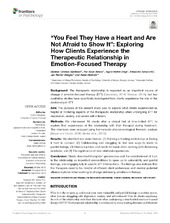| dc.contributor.author | Nødtvedt, Øystein Ottesen | |
| dc.contributor.author | Binder, Per-Einar | |
| dc.contributor.author | Stige, Signe Hjelen | |
| dc.contributor.author | Schanche, Elisabeth | |
| dc.contributor.author | Stiegler, Jan Reidar | |
| dc.contributor.author | Hjeltnes, Aslak | |
| dc.date.accessioned | 2020-03-12T12:44:07Z | |
| dc.date.available | 2020-03-12T12:44:07Z | |
| dc.date.issued | 2019-09-04 | |
| dc.Published | Nødtvedt ØO, Binder P-E, Stige SH, Schanche E, Stiegler JR, Hjeltnes A. “You Feel They Have a Heart and Are Not Afraid to Show It”: Exploring How Clients Experience the Therapeutic Relationship in Emotion-Focused Therapy. Frontiers in Psychology. 2019;10:1996 | eng |
| dc.identifier.issn | 1664-1078 | |
| dc.identifier.uri | https://hdl.handle.net/1956/21474 | |
| dc.description.abstract | Background: The therapeutic relationship is regarded as an important source of change in emotion-focused therapy (EFT), but few qualitative studies have specifically investigated how clients experience the role of the relationship in EFT. Aim: The purpose of the present study was to explore what clients experienced as helpful or hindering aspects of the therapeutic relationship when undergoing EFT for depression, anxiety, and severe self-criticism. Methods: We interviewed 18 clients after a clinical trial of time-limited EFT, to explore their experiences of the relationship with their therapist during treatment. The interviews were analyzed using hermeneutic-phenomenological thematic analysis. Results: We identified four main themes: (1) Forming a trusting relationship or finding it hard to connect, (2) Collaborating and struggling to find new ways to relate to painful feelings, (3) Alliance ruptures and needs for repair when working with distressing emotions, and (4) The significance of new relational experiences. Conclusion: Clients described therapists’ genuineness and the establishment of trust in the relationship as important preconditions to open up to vulnerability and painful feelings, and engaging fully in specific EFT interventions. The findings also indicate that the therapists need to be mindful of different client preferences and monitor potential alliance ruptures when working to change distressing emotions in therapy. | en_US |
| dc.language.iso | eng | eng |
| dc.publisher | Frontiers | eng |
| dc.rights | Attribution CC BY | eng |
| dc.rights.uri | http://creativecommons.org/licenses/by/4.0/ | eng |
| dc.subject | emotion-focused therapy | eng |
| dc.subject | the therapeutic relationship | eng |
| dc.subject | thematic analysis | eng |
| dc.subject | depression | eng |
| dc.subject | self-criticism | eng |
| dc.title | “You Feel They Have a Heart and Are Not Afraid to Show It”: Exploring How Clients Experience the Therapeutic Relationship in Emotion-Focused Therapy | eng |
| dc.type | Peer reviewed | |
| dc.type | Journal article | |
| dc.date.updated | 2019-11-24T19:32:36Z | |
| dc.description.version | publishedVersion | |
| dc.rights.holder | Copyright 2019 Nødtvedt, Binder, Stige, Schanche, Stiegler and Hjeltnes | eng |
| dc.identifier.doi | https://doi.org/10.3389/fpsyg.2019.01996 | |
| dc.identifier.cristin | 1740298 | |
| dc.source.journal | Frontiers in Psychology | |

